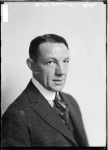Chicago Baseball Museum to honor Veeck family on Sept. 20
By Dr. David Fletcher
The Veterans Committee meets in Nashville this December during baseball’s Winter Meetings to vote on 10 candidates from the 1876-1946 era to be inducted into the Baseball Hall of Fame.
Right after this year’s World Series, the BBWAA-appointed Historical Overview Committee that acts as the screening committee will select 10 candidates — retired Major League Baseball players no longer eligible for election by the BBWAA, managers, umpires or executives — for the Pre-Integration Era Ballot.
One dark horse, but extremely worthy candidate for this year’s Pre-Integration Era ballot is MLB executive William Louis Veeck (1877-1933), who was the President of the Chicago Cubs from July 1919 until his death in October 1933.
 William Veeck is an unsung hero in MLB history, a man who helped ferret gambling out of the national pastime and helped transform baseball from a cottage industry to a dynamic entertainment industry with his intricate involvement in the creation of the first Commissioner’s Office in 1920 and other innovations such as Ladies’ Day that helped attract a new base of fans.
William Veeck is an unsung hero in MLB history, a man who helped ferret gambling out of the national pastime and helped transform baseball from a cottage industry to a dynamic entertainment industry with his intricate involvement in the creation of the first Commissioner’s Office in 1920 and other innovations such as Ladies’ Day that helped attract a new base of fans.
While better known as the father of Bill Veeck, who grew up at Wrigley Field because his father was the Cubs’ President and minority owner, the elder Veeck had a stellar career of his own and had a lasting impact on the national pastime:
- William had a distinguished career as a sportswriter for 16 years writing for the Chicago American and other papers under the pseudonym of Bill Bailey. Veeck covered both the Cubs and White Sox and had suspected that the 1918 Cubs had tanked the World Series against the Red Sox.
- William Veeck was the person who started the investigation of the Black Sox Scandal on August 31, 1920, when he was alerted about the Cubs-Phillies game being fixed and soon a Grand Jury was impaneled in Cook County to investigate gambling in baseball.
- He helped engineer the creation of MLB’s first commissioner and was the person who pushed his friend Judge Kenesaw Mountain Landis to become the first commissioner. Landis ruled Major League Baseball from Michigan Avenue in Chicago from 1920-1944.
- William Veeck was the genius who realized the power of radio to market baseball in 1925 when he cut a deal with WMAQ and the Cubs’ attendance from 1925 to 1931 went up 119% while the other seven NL clubs attendance only went up 27% in the same time period.
- He was the first MLB executive to promote a woman into an executive level in Major League baseball in 1924 when he promoted Margaret Donahue to Club Secretary with the Cubs.
- He is the person who made the physical changes at Wrigley Field in the late 1920s that made the park attractive.
- Two of his teams played in the World Series (’29, ’32).
- In 1933, he presented “The Veeck Plan” to have inter-league play to increase interest and attendance in baseball, a plan that was finally adopted by MLB in 1997.
- He convinced the MLB owners to go along with Chicago Tribune sports editor Arch Ward’s idea of an All-Star Game in 1933.
William Louis Veeck Sr. belongs in the Hall of Fame to join his son Bill Veeck as an innovative pioneering MLB executive.
The Chicago Baseball Museum plans to actively advocate for William Louis Veeck’s selection by the BBWWA Historical Overview Committee to be included on this year’s pre-integration ballot after this year’s World Series.
On September 20, the CBM will host “One Family, Two Teams: The Impact of the Veecks on Chicago Baseball” at the Chicago History Museum, which will make the case for Veeck’s worthiness to be elected to the Hall of Fame by the Veterans Committee this December. For more information, visit www.chicagobaseballmuseum.org.
Dr. David Fletcher, a longtime SABR member, is founder and president of the Chicago Baseball Museum.
Originally published: September 18, 2012. Last Updated: September 18, 2012.


